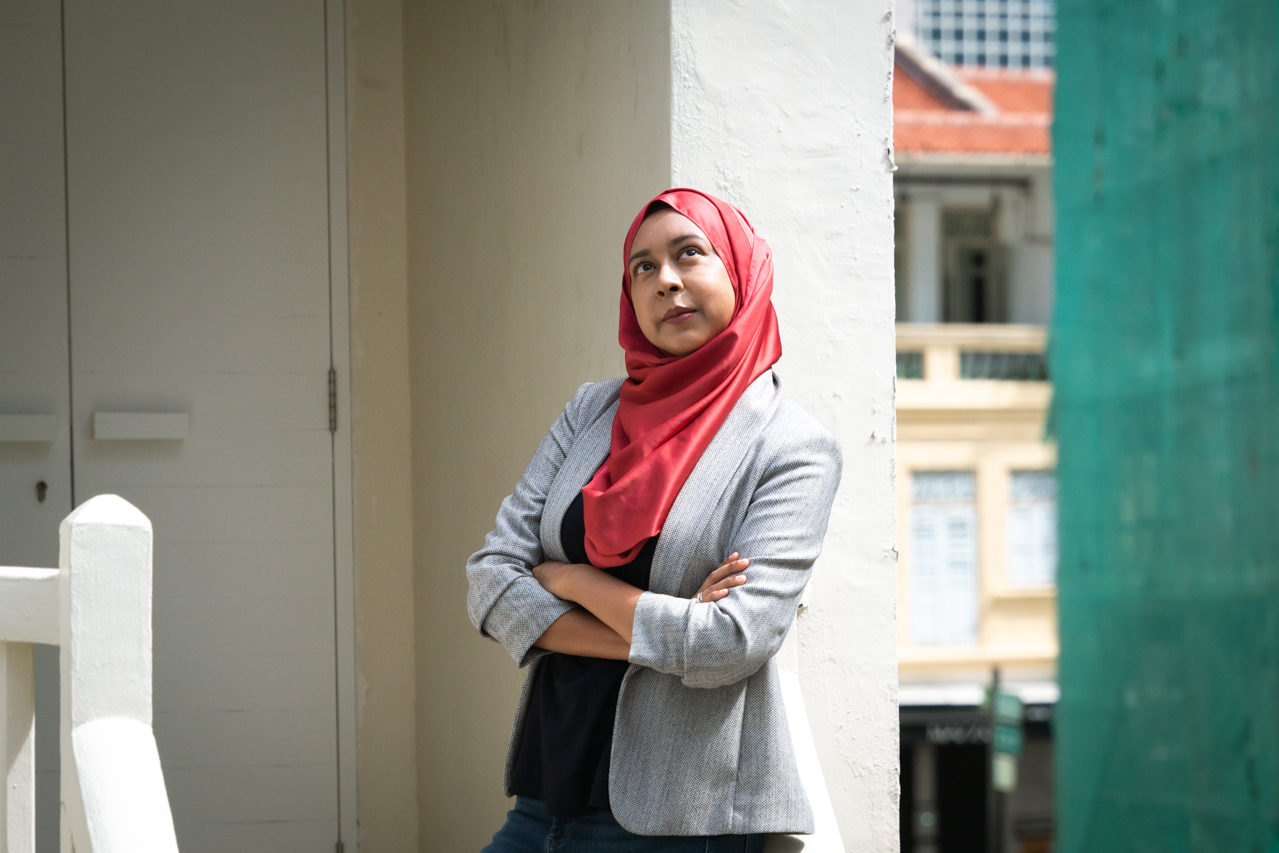One thing became abundantly clear during my conversation with Nurul Jihadah, founder of The Codette Project. She’s a staunch and unmovable realist, while I, true to form, live in the heady, airy-fairy world of appealing to the goodness of society and the good nature of corporations.
“You’re a very positive person, Zat,” Nurul remarks several times throughout our interview. I can’t help it. Being a realist has brought me much too much grief over the years. Expecting and demanding the world to know better and do better is, as I’ve learnt, a fool’s errand.
Our differing views of the world frame the tenor of our conversation where Nurul shares her thoughts on how corporations should carve space for minority/Muslim women in the tech industry, and how they need to take decisive steps in ensuring diversity that is not just performative. We segue several times during this interview, veering off the beaten track to also delve into the subject of representation, society’s romanticisation of the tragedy narrative, and institutional responsibility in ensuring diversity in the world of tech.
Zat Astha: How would you describe what you do to someone you’re meeting for the first time?
Nurul Jihadah: My name is Nurul Jihadah Hussain, and I’m the founder of The Codette Project, a ground-up initiative that’s trying to get more minority/Muslim women into tech.
How have the objectives of the Codette Project changed since its founding in 2015?
What has changed is the execution of our projects and programmes. But in terms of the organisation’s purpose, that much hasn’t changed, that is, to provide minority women with awareness and access to the tech industry.
I view tech as the most level economic playing field. That’s not to say that tech in and of itself is perfect, but it is one of the fields which you can enter from any expertise level and any background. There are also a lot fewer costs associated with learning the skills necessary to get to the next level. Unlike, say, a lawyer, a doctor, or an engineer, where the upfront cost for you to be professionally trained is much higher.
Do you mean the technicalities of the skills?
Yes. It’s less fiscally prohibitive to get into the tech industry. But to answer your original question, the economic aspiration of The Codette Project, where we aim to create long-term economic change within the industry, hasn’t changed. The how of it has.
What was it like in the early days of The Codette Project?
Initially, we thought maybe we should do a three-month boot camp where we get under-resourced women to participate, and then three months later, they can get a job in the tech industry. But then, in August 2016, we held our very first event—Tea with Codettes—a focus group where we put forward the ideas we had and to see if it was something women would be interested in doing. Everyone said no.
So we thought, “Okay, that’s fair.” The truth is, we had forgotten who the target audience was and what they wanted. So we regrouped and decided to focus instead on minority/Muslim women as a whole and thought about what they wanted. At the focus group, we found out that minority/Muslim women knew that they want to do something in tech, but they might not know anyone in the industry or how to get there. That’s where they, or we, really needed support.
So that then has shaped everything that we’ve done since—centring the experiences and the needs of minority/Muslim women at the core of what we do.
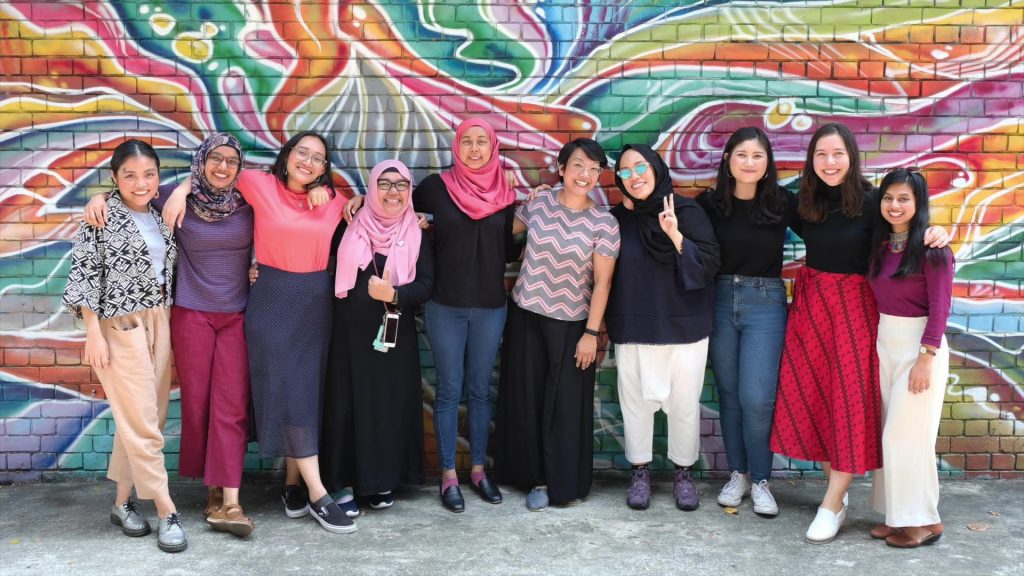
I want to challenge organisations to look at their hiring processes and observe
at what point in the process do minorities or women drop off.
What would success for The Codette Project look like?
Our measure of success has always been the same, and it’s making a change in someone’s life, even if it’s just one person.
Many non-profit and social impact organisations are forced to justify their existence on the matrix of growth and impact on a large scale. But I think for us, it’s evident. If we run an event and only one woman attends, and she feels like she’s benefited in some way, then that, to us, is success. When we look at these normative matrixes of success, we forget that these are forms and definitions of success that corporations and systems have created. But there’s a gap that these corporations and systems haven’t filled, and this is what we’re filling.
Do you feel like it has still not been met? I mean, it’s been five years since The Codette Project was founded. Do you think that from then until now, that gap still hasn’t been met?
Yes, I do. While not perfect, the good thing about the tech industry is that they are very data-driven and are pretty open on the need for diverse representation. And if you look at the numbers, it’s obvious that at every single level, we’re still not seeing a proportionate representation of minority/Muslim women. We would like to see 10% of the tech industry at every level from the C-suite onwards be made up of minority/Muslim women. Right now, that’s not the case.
Why do you think that this is?
The answer to that is dependent on individual organisations and companies. I want to challenge organisations to look at their hiring processes and observe at what point in the process do minorities or women drop off. It’s a different question if you place a job ad where 5% of the applicants are women, but 5% of the people you hire are also women. Then it’s clear that the problem starts at the onset, and the question is how to get more women to apply.
But if 40% of your applicants are women or minority women for that matter, but only 5% of the hires are women, then that’s a problem with how you are hiring. These are very particular questions that I think companies need to look at to analyse the gaps they need to fix.
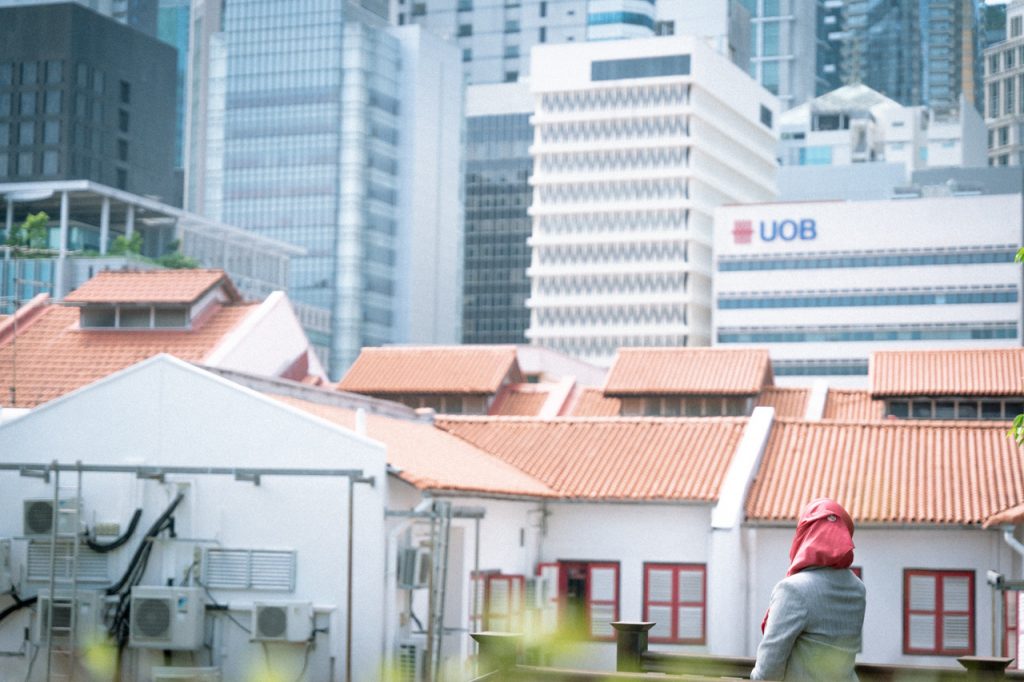
Is there something that you feel the tech industry has gotten right that they’re doing right now?
One very obvious thing is that we’ve stopped accepting ‘man-els’—man panels. Male-only panels are no longer as acceptable as they used to be, and that’s a good thing. But there is a lot more that needs to be done when it comes to having a truly diverse panel because that also includes ensuring that there are people from different backgrounds who’ve had different lived-in experiences participating in the conversation.
Whereas what I think an easy win has been for many people is to have diverse panels only in gender, but actually, everyone is from a very similar background. That’s not the kind of diversity that is enough in the future. The movement is positive, no doubt, but we can also do more. Journeying in diversity is essential because if you regard it like that, a journey, then there’s never going to be an endpoint. It’s ridiculous to think that there will ever be enough diversity.
Do you worry about the detractors who would say things like, “Yes, all this diversity and representation is great, but they’re all performative in essence”?
Yes, there will always be people who would say that. But I’m not interested in justifying the existence of The Codette Project to people like that. That gap where people believe that diversity is performative is not a logical gap. That’s a moral gap.
And that justification, that question of “why is diversity important”, is often used by people who fundamentally don’t believe that other people are equal. You can’t solve that with logic or data. They’re people who fundamentally don’t believe in principles of diversity. I’m not here to convince them, nor am I here to work with them. That’s just work that we’re not here for. The Codette Project really only wants to work with people who believe in diversity and equality as we do.
The Codette Project is a story of people who have come together to say we deserve equal success.
Where did you grow up?
In Singapore. Somewhere in the West.
But what was your childhood like?
It was great. One thing that I’ve seen with Codette is that some people expect Codette, for some reason, to have a tragedy-to-success narrative. That’s a very damaging thing because they are under this presumption that, to search for equality and to believe that equality and diversity are necessary, you have to have had some immense tragedy in your past that you’ve had to overcome.
It’s like a sort of romanticisation.
It is, but it also then excuses people who have not had a tragic narrative from saying that “I too believe that diversity is important”. The Codette Project is a story of people who have come together to say we deserve equal success. We’re trying to build the narrative that fundamentally, minority and Muslim women deserve to be equally successful and that talent, intelligence, and capability are equally distributed amongst all people. What differs is access and opportunity.
We’re asking the people and organisations who have access and opportunity to agree that this is something that should be equally distributed. And that’s something that we’re trying to provide, so we never have to tell women, “Well, you know, the reason why you’re not into it is that you’re not good enough” because fundamentally, that’s not true.
But I think in terms of narrative and trajectory, I’ve had a great education. I’ve been very grateful for many things that I’ve had, but I’ve also often been the only one that looks like me in a lot of different places. And I think that shouldn’t be the case.
There are many women who I see and meet who should have had these experiences that I’ve had but don’t. That plays a part in my belief fundamentally that minority and Muslim women are severely underrepresented. They’re not at the table, and this is not because of any fundamental lack within themselves.
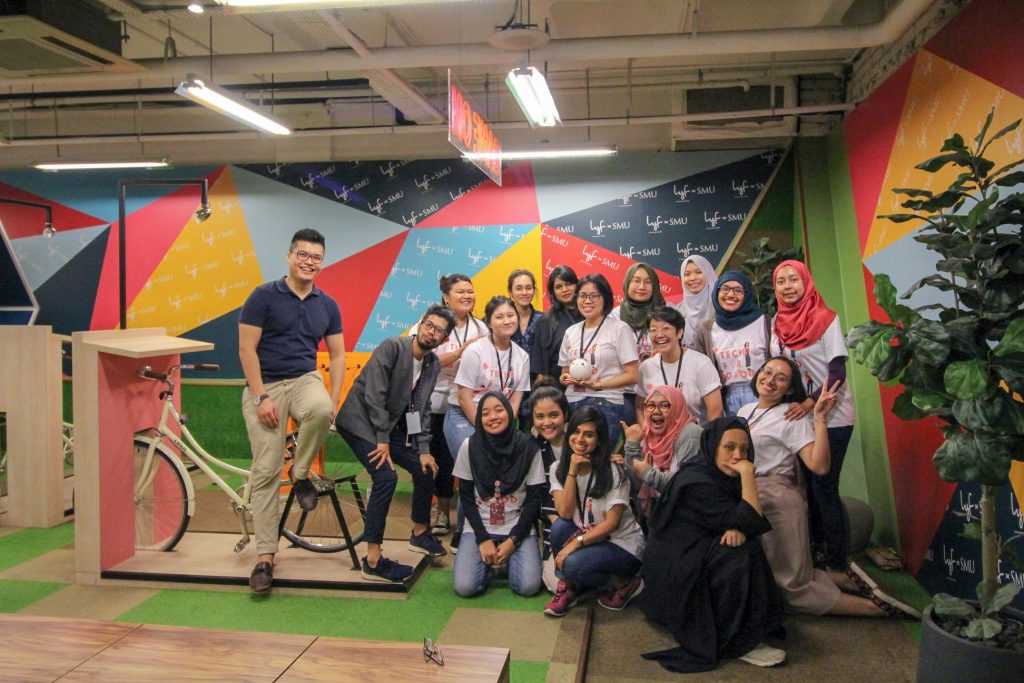
If it’s not because of themselves, then why are they not at the table?
They don’t have access, or they don’t have the opportunity.
What do you mean by access?
Let’s take the hackathon we organised as an example. When we were organising the first women-only hackathon in Singapore, we were shocked to learn that this had never been done before. A lot of the resistance and questions we had stemmed from people doubting if we could even get enough women to participate or if this is something they even need. We went ahead and organised it anyway and sold out in a bit more than a week. That first time, we had about 60 attendees.
The second time we ran it in 2019, we doubled the number of spaces to a little more than a hundred, and it sold in two weeks. All this is proof that women want to be in tech; we want to do hackathons, we want to be here.
We were also the first hackathon that had breastfeeding rooms and offered childcare in our second run. We know many women still have caring responsibilities, so if we could help with that, why not? We also know that many younger women may not have familial permissions to stay out late, so we kept the event from 8am to 8pm. There’s no alcohol, and we catered to different kinds of dietary needs. We made provisions for a multi-faith prayer and meditation room as well. These are all very basic things that we did because we thought about what women needed to be able to attend the hackathon.
Are you surprised that such provisions are not more keenly provided for?
I mean, you don’t have to look far than at some of the biggest tech conferences in Asia that have not provided prayer rooms, even though a large portion of the attendees came from Indonesia and Malaysia. This shows that a lot of the norms that we take as being neutral are built on an understanding of the user and the community from a particular type of background. What that means is that we don’t even know who could have had access because they’re not considered consumers.
But for The Codette Project, because we put minority/Muslim women at the centre of what we do, all these provisions we provide are part and parcel of the event. And I think what we’ve shown was that it’s completely possible to have that ability to be more inclusive and to provide more access.
The question then becomes, do you want to do that?
Is the problem then quite systemic?
The problem is systemic, but I think even with the concept of it being a systemic problem, I think the issue was that no one considered it a problem. They’re aware that women are not coming to hackathons, but no one wants to bear the responsibility of the problem—they put it on women.
So rather than it being just another systemic problem, a more significant issue is how we conceptualise responsibility. The narrative of underrepresentation is often taken to be individual responsibility, individual stories. But actually, the burden of ensuring better representation and better access and better opportunity is institutional.
Does that put too much responsibility on institutions? I’ve always believed that if people in society deem something the right thing to do, that will inform how institutions decide on their own beliefs and principles.
You are such a positive person.
I am, I am.
But fundamentally, that is not true.
Is it not? You don’t think that if society demands it, institutions will eventually catch up? It’s pretty evident in the increased diversity and inclusion practices and companies taking a more active role in standing up for minority rights.
But this is reactive. So we are asking institutions to react to public pressure, but that puts the responsibility on to the public to work and call for these changes.
Look, I believe that fundamentally institutions benefit from society. But also, institutions are not just large groups of people; they are run according to certain ideas of what makes the most profit? What are our intentions? How do we run? And I think that is not necessarily entirely dependent on how society acts. Institutions and organisations are actors in the world with a lot of access and opportunity to things like capital. And that’s important because that’s a huge driver for change.
Between private and government institutions, who do you think bears the most responsibility?
They both should bear equal responsibility. I don’t think there are two extremes in this. It’s a pointless debate given that now it’s apparent that what everyone should be working towards is increased representation and diversity. What is more valuable is figuring out what aspects of this problem can be solved by the state and which can be helped by private organisations. That is a more productive way of looking at things.
What has been the worst thing anyone has ever said about your work at The Codette Project?
Very early on, we requested funding and support from an organisation, and we got rejected. They said that the work we do is not impactful because it’s a minor problem that affects only a small group. They say the work we’re doing is not essential because it’s a specific group of women. That was very painful because how do you expect me to show you that minority/Muslim women deserve equal success when you don’t even give us the chance to get funding and support because you don’t think this is a large enough group to help.
Often people view our existence simply in terms of numbers—are you sustainable, are you making a lot of money, are you tracking your numbers? They don’t see that a lot of the important ways you create change cannot be measured by traditional and corporate measures.
So the opposite aspect to this would be organisations and people that have believed in us. Facebook in 2018 and Zendesk in 2020 have both showed up for us in terms of resources and funding that enabled us to do the kind of work we wanted to do.
Honestly, both times I couldn’t believe that they shared the vision that we did. I am so grateful to have had these organisations stand up and say yes, this is the kind of work we can get behind. Zendesk, especially, during COVID-19, gave us funding unexpectedly in 2020, right as we were spending our last tranche of funds on our Codette Cares project because we wanted to help women who were affected by COVID-19.
I cried on that call when I realised their funding was real; my whole team cried when I told them. It meant so much to us to be able to continue doing the work we wanted to do in the way we wanted to do it.
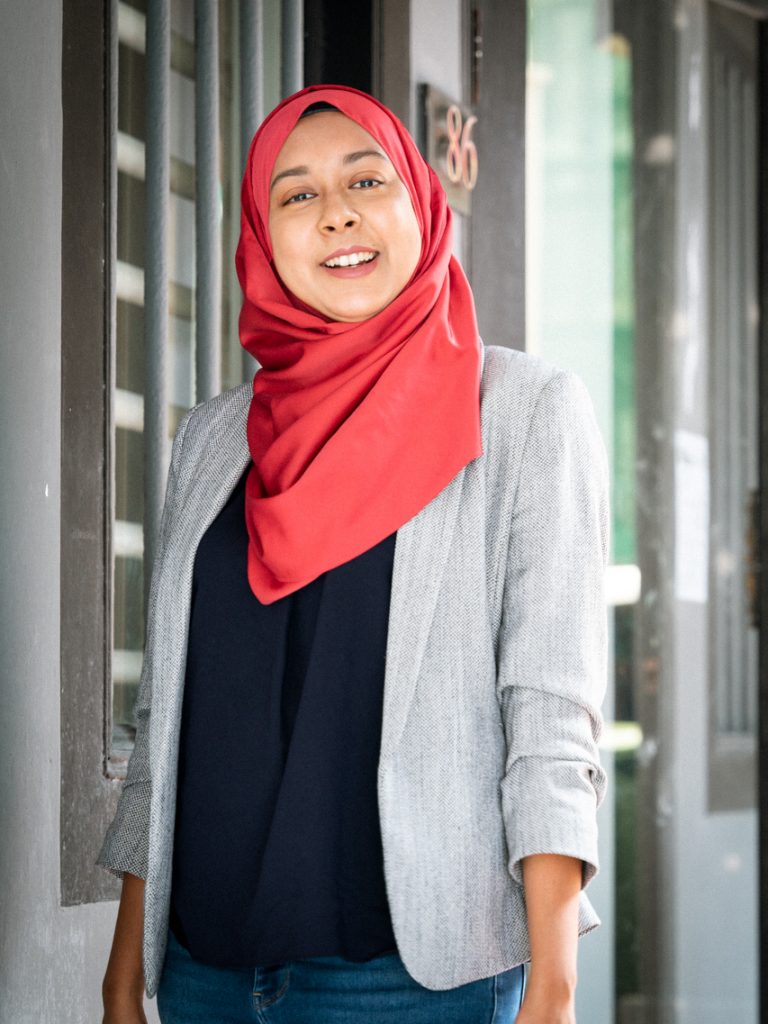
I appreciate how younger people have been able to express powerful, deep-seated emotion
in ways that have been highly productive and extremely clear.
How would you define success for The Codette Project?
Success for us is long-term. Fundamentally, we are loss-making. We are not sustainable. But the requirement for non-profit and social impact organisations to be sustainable puts a significant burden on these organisations to justify our answers to problems that exist because communities don’t have the same access, the same resources, or the same opportunities. So I think to insist that we need to be sustainable to exist would be very unfair.
Instead of asking me to justify why The Codette Project is not sustainable, I think what people should see is that we’ve been around for five years. I’ve seen women get jobs that they didn’t know they could get, and we’re helping to change this conversation around what success looks like for our community. That’s very heartening for me because each woman is a catalyst for change. What women do impacts their family, their friends, their social circle. So then, to amplify change, all you need is one woman and to treat them individually as being that possibility for that change. That’s what I mean by long-term.
When you look at the state of the world today, what worries you the most?
I think people assume that tech is fundamentally good. We’re not questioning whether a lot of the ways we are digitising and the ensuing issues we’re having are good or bad. Take, for example, the rise in the number of older people being scammed due to banking services being pushed online. These are problems that didn’t exist before digitisation.
So can we argue then that digitisation is good for the community? That’s a tough question—should we be asking if they would not have been better off if they had to bank in person, talk to their bank teller, see their bank as not just a financial institution but a social one.
Do you mean manually?
Yes, manually. We need to question many of these norms around tech, including even if a lot of techs is good for society.
Isn’t it difficult if it has to be absolutes? I don’t think it’s realistic to say that something is either good or bad. Tech is good for some purposes, wouldn’t you say?
We have to view tech as a tool and start to question the costs and benefits of how we’re using tech. Most times, people just look at the benefits and not the costs of it.
But if it is not 100% absolutely good, is that okay?
Not to the person who’s not part of that one hundred per cent. But is that person even considered important is the question. We hear stories of the elderly losing thousands of dollars due to online banking scams. When people read about it, they say, well, it doesn’t affect me; this is not a cause I have to handle because I save a lot of money and time with digital banking. It’s okay for me. But does that make it right?
It’s a very difficult world.
This is probably why you have a more optimistic worldview. Me, maybe not so much.
When you look at the state of the world today, what is the one thing that gives you hope?
I appreciate how younger people have been able to express powerful, deep-seated emotion in ways that have been highly productive and extremely clear. To see that massive amount of emotions come out from people regarding different issues, I think that’s very powerful because it’s proof that young people care. They care more than anyone expected them to. They care more than they should have to because they’re dealing with a lot of crap right now. But they still care. They see something that’s not right, and decide “I’m going to do something about it.”
They are the “I’m going to do something generation”.
They are the generation that understands that they will bear the consequences of the mistakes of all the previous generations. That has made many young people very absolute in understanding that change needs to happen as quickly as possible. And to me, that’s a really beautiful thing.
In Singapore, you see many young people who have created Instagram platforms to discuss various social issues and curated spaces where it might be very difficult or emotional to approach these topics. But they still do it anyway. I’m in awe of the kind of intersectional solidarity that young people are capable of. It’s not something I imagined I could do when I was young, but yes, that gives me hope and is something I am learning from.
Do you think organisations are doing enough to ensure diversity and representation in tech? Tell us at community@ricemedia.co.
If you haven’t already, follow RICE on Instagram, Spotify, Facebook, and Telegram. If you have a lead for a story, feedback on our work, or just want to say hi, you can also email us at community@ricemedia.co.

